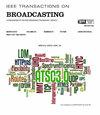MAFBLiF:基于多尺度注意力特征融合的盲光场图像质量评估
IF 4.8
1区 计算机科学
Q2 ENGINEERING, ELECTRICAL & ELECTRONIC
引用次数: 0
摘要
光场成像同时捕捉光线的强度和方向信息,为用户提供更身临其境的视觉体验。然而,在成像、处理、编码和重建过程中,光场图像(lfi)可能会遇到各种畸变,从而降低其视觉质量。与二维图像质量评估相比,光场图像质量评估(LFIQA)不仅需要考虑空间域的图像质量,还需要考虑角域的图像质量退化。为了有效地建模视觉感知和LFI质量的相关因素,本文提出了一种基于多尺度注意特征融合的盲LFIQA度量,命名为mafiff。该度量由以下几个部分组成:MLI-Patch生成、空间角特征分离模块、空间角特征提取骨干网络、金字塔特征对齐模块和patch关注模块。这些模块专门用于提取lfi的空间和角度信息,并捕获多层次信息和感兴趣的区域。在此基础上,提出了一种以LFI的梯度信息和显著性为指导的池化方案,将所有mli -patch的质量整合到输入LFI的整体质量中。最后,为了证明所提出度量的有效性,在三个具有代表性的LFI质量评估数据集上进行了广泛的实验。实验结果表明,所提出的度量优于其他最先进的图像质量评估度量。代码将在https://github.com/oldblackfish/MAFBLiF上公开。本文章由计算机程序翻译,如有差异,请以英文原文为准。
MAFBLiF: Multi-Scale Attention Feature Fusion-Based Blind Light Field Image Quality Assessment
Light field imaging captures both the intensity and directional information of light rays, providing users with more immersive visual experience. However, during the processes of imaging, processing, coding and reconstruction, light field images (LFIs) may encounter various distortions that degrade their visual quality. Compared to two-dimensional image quality assessment, light field image quality assessment (LFIQA) needs to consider not only the image quality in the spatial domain but also the quality degradation in the angular domain. To effectively model the factors related to visual perception and LFI quality, this paper proposes a multi-scale attention feature fusion based blind LFIQA metric, named MAFBLiF. The proposed metric consists of the following parts: MLI-Patch generation, spatial-angular feature separation module, spatial-angular feature extraction backbone network, pyramid feature alignment module and patch attention module. These modules are specifically designed to extract spatial and angular information of LFIs, and capture multi-level information and regions of interest. Furthermore, a pooling scheme guided by the LFI’s gradient information and saliency is proposed, which integrates the quality of all MLI-patches into the overall quality of the input LFI. Finally, to demonstrate the effectiveness of the proposed metric, extensive experiments are conducted on three representative LFI quality evaluation datasets. The experimental results show that the proposed metric outperforms other state-of-the-art image quality assessment metrics. The code will be publicly available at
https://github.com/oldblackfish/MAFBLiF
.
求助全文
通过发布文献求助,成功后即可免费获取论文全文。
去求助
来源期刊

IEEE Transactions on Broadcasting
工程技术-电信学
CiteScore
9.40
自引率
31.10%
发文量
79
审稿时长
6-12 weeks
期刊介绍:
The Society’s Field of Interest is “Devices, equipment, techniques and systems related to broadcast technology, including the production, distribution, transmission, and propagation aspects.” In addition to this formal FOI statement, which is used to provide guidance to the Publications Committee in the selection of content, the AdCom has further resolved that “broadcast systems includes all aspects of transmission, propagation, and reception.”
 求助内容:
求助内容: 应助结果提醒方式:
应助结果提醒方式:


